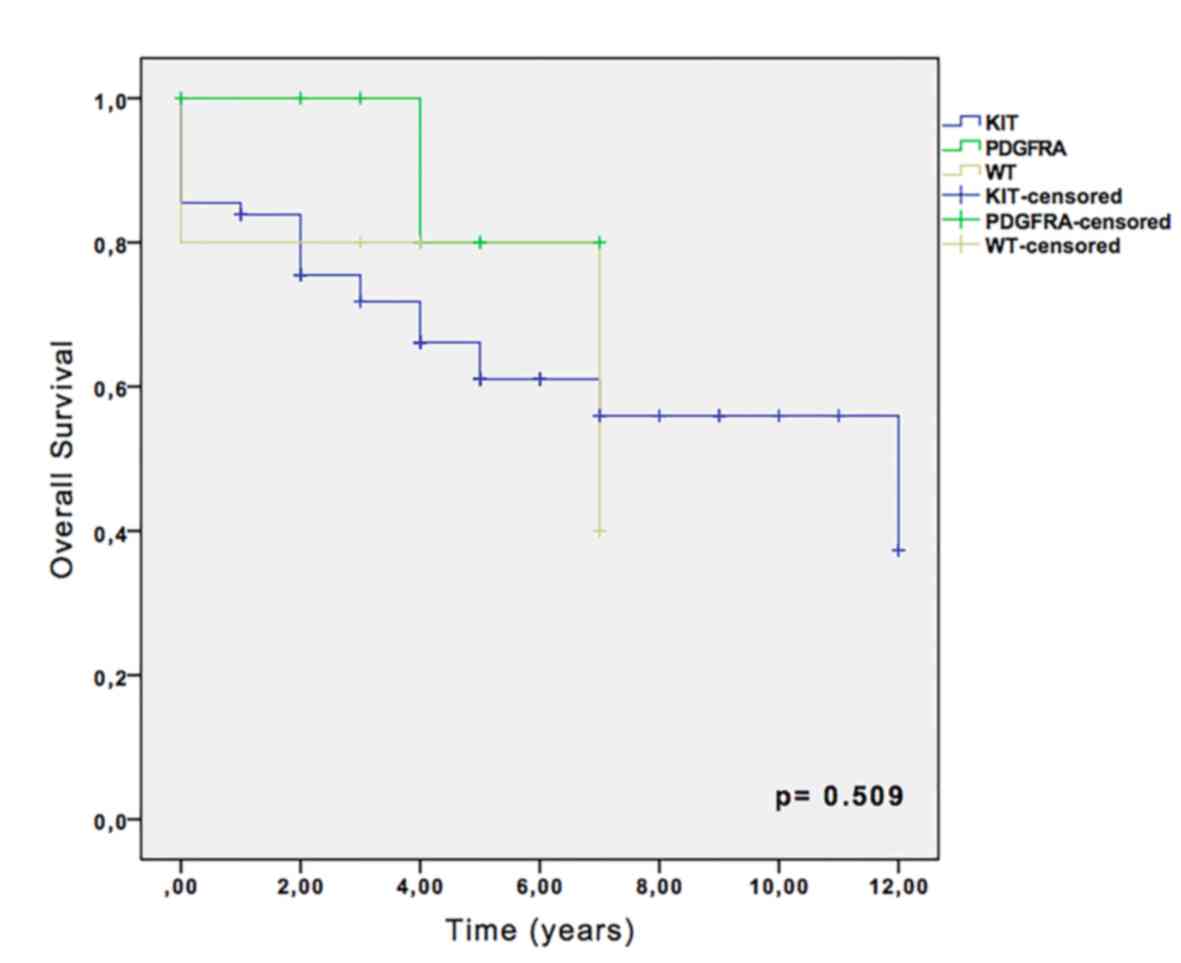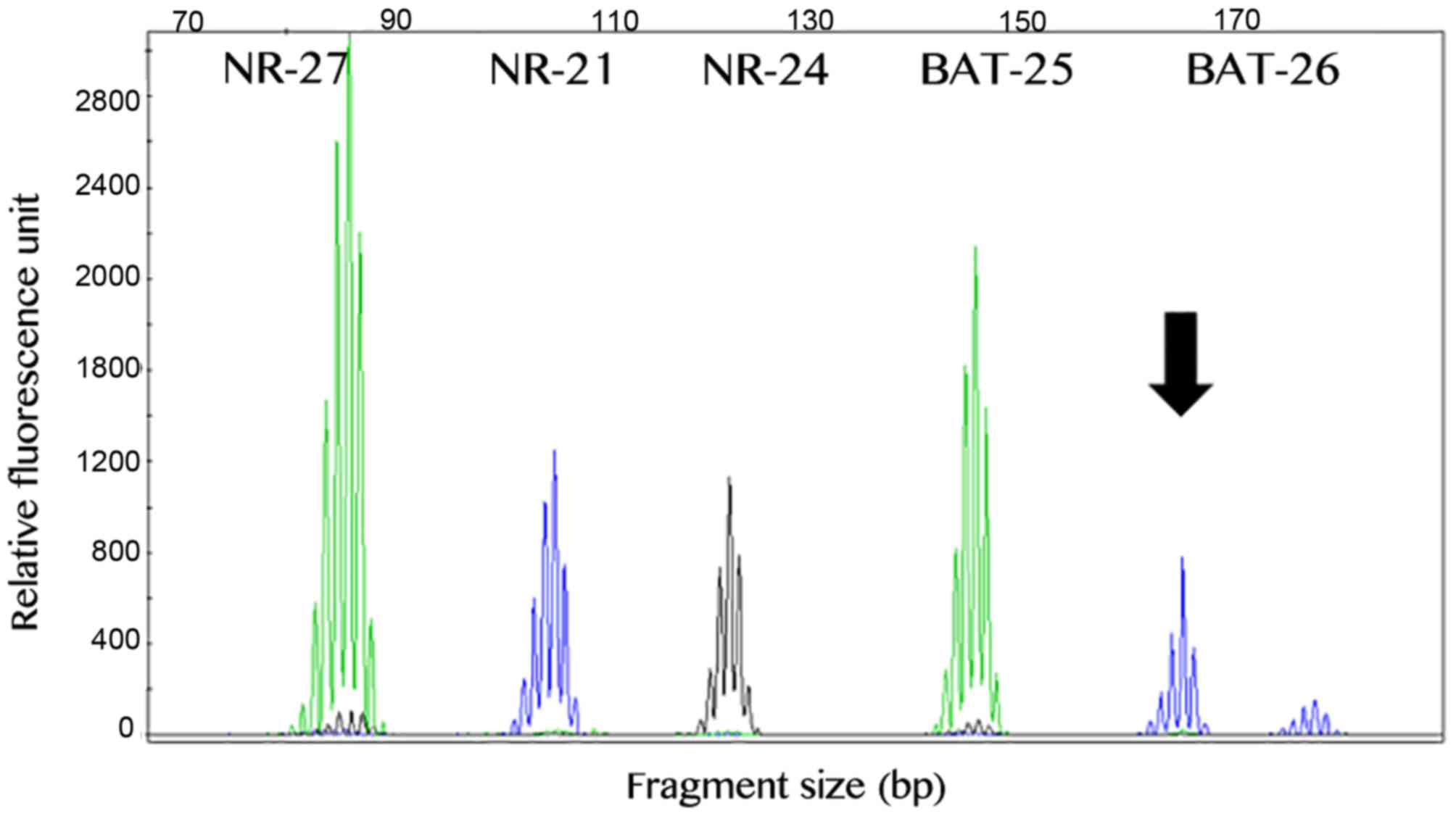|
1
|
Le DT, Uram JN, Wang H, Bartlett BR,
Kemberling H, Eyring AD, Skora AD, Luber BS, Azad NS, Laheru D, et
al: PD-1 Blockade in tumors with mismatch-repair deficiency. N Engl
J Med. 372:2509–2520. 2015. View Article : Google Scholar : PubMed/NCBI
|
|
2
|
Dudley JC, Lin MT, Le DT and Eshleman JR:
Microsatellite instability as a biomarker for PD-1 blockade. Clin
Cancer Res. 22:813–820. 2016. View Article : Google Scholar : PubMed/NCBI
|
|
3
|
Young J, Simms LA, Biden KG, Wynter C,
Whitehall V, Karamatic R, George J, Goldblatt J, Walpole I, Robin
SA, et al: Features of colorectal cancers with high-level
microsatellite instability occurring in familial and sporadic
settings: Parallel pathways of tumorigenesis. Am J Pathol.
159:2107–2116. 2001. View Article : Google Scholar : PubMed/NCBI
|
|
4
|
Miquel C, Jacob S, Grandjouan S, Aimé A,
Viguier J, Sabourin JC, Sarasin A, Duval A and Praz F: Frequent
alteration of DNA damage signalling and repair pathways in human
colorectal cancers with microsatellite instability. Oncogene.
26:5919–5926. 2007. View Article : Google Scholar : PubMed/NCBI
|
|
5
|
Suraweera N, Duval A, Reperant M, Vaury C,
Furlan D, Leroy K, Seruca R, Iacopetta B and Hamelin R: Evaluation
of tumor microsatellite instability using five quasimonomorphic
mononucleotide repeats and pentaplex PCR. Gastroenterology.
123:1804–1811. 2002. View Article : Google Scholar : PubMed/NCBI
|
|
6
|
Sinicrope FA and Sargent DJ: Molecular
pathways: Microsatellite instability in colorectal cancer:
Prognostic, predictive, and therapeutic implications. Clin Cancer
Res. 18:1506–1512. 2012. View Article : Google Scholar : PubMed/NCBI
|
|
7
|
McCarter MD, Antonescu CR, Ballman KV,
Maki RG, Pisters PW, Demetri GD, Blanke CD, von Mehren M, Brennan
MF, McCall L, et al: Microscopically positive margins for primary
gastrointestinal stromal tumors: Analysis of risk factors and tumor
recurrence. J Am Coll Surg. 215:53–60. 2012. View Article : Google Scholar : PubMed/NCBI
|
|
8
|
Corless CL, Barnett CM and Heinrich MC:
Gastrointestinal stromal tumours: Origin and molecular oncology.
Nat Rev Cancer. 11:865–878. 2011.PubMed/NCBI
|
|
9
|
Doyle LA and Hornick JL: Gastrointestinal
stromal tumours: From KIT to succinate dehydrogenase.
Histopathology. 64:53–67. 2014. View Article : Google Scholar : PubMed/NCBI
|
|
10
|
Laurini JA and Carter JE: Gastrointestinal
stromal tumors: A review of the literature. Arch Pathol Lab Med.
134:134–141. 2010.PubMed/NCBI
|
|
11
|
Guller U, Tarantino I, Cerny T, Schmied BM
and Warschkow R: Population-based SEER trend analysis of overall
and cancer-specific survival in 5138 patients with gastrointestinal
stromal tumor. BMC Cancer. 15:5572015. View Article : Google Scholar : PubMed/NCBI
|
|
12
|
Fregnani JH, de Oliveira AT, de Lima
Vazquez V, Viana CR, Longatto-Filho A and Reis RM: Is the
gastrointestinal stromal tumor arising in the rectovaginal septum
an extragastrointestinal entity? A time for reflection. Int J
Colorectal Dis. 26:387–389. 2011. View Article : Google Scholar : PubMed/NCBI
|
|
13
|
Joensuu H, Hohenberger P and Corless CL:
Gastrointestinal stromal tumour. Lancet. 382:973–983. 2013.
View Article : Google Scholar : PubMed/NCBI
|
|
14
|
Liegl-Atzwanger B, Fletcher JA and
Fletcher CD: Gastrointestinal stromal tumors. Virchows Arch.
456:111–127. 2010. View Article : Google Scholar : PubMed/NCBI
|
|
15
|
Miettinen M and Lasota J: Gastrointestinal
stromal tumors: Pathology and prognosis at different sites. Semin
Diagn Pathol. 23:70–83. 2006. View Article : Google Scholar : PubMed/NCBI
|
|
16
|
Stamatakos M, Douzinas E, Stefanaki C,
Safioleas P, Polyzou E, Levidou G and Safioleas M: Gastrointestinal
stromal tumor. World J Surg Oncol. 7:612009. View Article : Google Scholar : PubMed/NCBI
|
|
17
|
Joensuu H, Martin-Broto J, Nishida T,
Reichardt P, Schöffski P and Maki RG: Follow-up strategies for
patients with gastrointestinal stromal tumour treated with or
without adjuvant imatinib after surgery. Eur J Cancer.
51:1611–1617. 2015. View Article : Google Scholar : PubMed/NCBI
|
|
18
|
Hirota S, Isozaki K, Moriyama Y, Hashimoto
K, Nishida T, Ishiguro S, Kawano K, Hanada M, Kurata A, Takeda M,
et al: Gain-of-function mutations of c-kit in human
gastrointestinal stromal tumors. Science. 279:577–580. 1998.
View Article : Google Scholar : PubMed/NCBI
|
|
19
|
Joensuu H, Rutkowski P, Nishida T, Steigen
SE, Brabec P, Plank L, Nilsson B, Braconi C, Bordoni A, Magnusson
MK, et al: KIT and PDGFRA mutations and the risk of GI stromal
tumor recurrence. J Clin Oncol. 33:634–642. 2015. View Article : Google Scholar : PubMed/NCBI
|
|
20
|
Braggio E, Braggio Dde A, Small IA, Lopes
LF, Valadão M, Gouveia ME, Moreira Ados S, Linhares E, Romano S,
Bacchi CE, et al: Prognostic relevance of KIT and PDGFRA mutations
in gastrointestinal stromal tumors. Anticancer Res. 30:2407–2414.
2010.PubMed/NCBI
|
|
21
|
Rubin BP and Heinrich MC: Genotyping and
immunohistochemistry of gastrointestinal stromal tumors: An update.
Semin Diagn Pathol. 32:392–399. 2015. View Article : Google Scholar : PubMed/NCBI
|
|
22
|
Barnett CM, Corless CL and Heinrich MC:
Gastrointestinal stromal tumors: Molecular markers and genetic
subtypes. Hematol Oncol Clin North Am. 27:871–888. 2013. View Article : Google Scholar : PubMed/NCBI
|
|
23
|
Agaimy A, Terracciano LM, Dirnhofer S,
Tornillo L, Foerster A, Hartmann A and Bihl MP: V600E BRAF
mutations are alternative early molecular events in a subset of
KIT/PDGFRA wild-type gastrointestinal stromal tumours. J Clin
Pathol. 62:613–616. 2009. View Article : Google Scholar : PubMed/NCBI
|
|
24
|
Martinho O, Gouveia A, Viana-Pereira M,
Silva P, Pimenta A, Reis RM and Lopes JM: Low frequency of MAP
kinase pathway alterations in KIT and PDGFRA wild-type GISTs.
Histopathology. 55:53–62. 2009. View Article : Google Scholar : PubMed/NCBI
|
|
25
|
Campanella NC, de Oliveira AT,
Scapulatempo-Neto C, Guimarães DP and Reis RM: Biomarkers and novel
therapeutic targets in gastrointestinal stromal tumors (GISTs).
Recent Pat Anticancer Drug Discov. 8:288–297. 2013. View Article : Google Scholar : PubMed/NCBI
|
|
26
|
Mol CD, Dougan DR, Schneider TR, Skene RJ,
Kraus ML, Scheibe DN, Snell GP, Zou H, Sang BC and Wilson KP:
Structural basis for the autoinhibition and STI-571 inhibition of
c-Kit tyrosine kinase. J Biol Chem. 279:31655–31663. 2004.
View Article : Google Scholar : PubMed/NCBI
|
|
27
|
Tan CB, Zhi W, Shahzad G and Mustacchia P:
Gastrointestinal stromal tumors: A review of case reports,
diagnosis, treatment and future directions. ISRN Gastroenterol.
2012:5959682012. View Article : Google Scholar : PubMed/NCBI
|
|
28
|
Rossi S, Gasparotto D, Miceli R,
Toffolatti L, Gallina G, Scaramel E, Marzotto A, Boscato E,
Messerini L, Bearzi I, et al: KIT, PDGFRA, and BRAF mutational
spectrum impacts on the natural history of imatinib-naive localized
GIST: A population-based study. Am J Surg Pathol. 39:922–930. 2015.
View Article : Google Scholar : PubMed/NCBI
|
|
29
|
Fukasawa T, Chong JM, Sakurai S, Koshiishi
N, Ikeno R, Tanaka A, Matsumoto Y, Hayashi Y, Koike M and Fukayama
M: Allelic loss of 14q and 22q, NF2 mutation, and genetic
instability occur independently of c-kit mutation in
gastrointestinal stromal tumor. Jpn J Cancer Res. 91:1241–1249.
2000. View Article : Google Scholar : PubMed/NCBI
|
|
30
|
Kose K, Hiyama T, Tanaka S, Yoshihara M,
Yasui W and Chayama K: Nuclear and mitochondrial DNA microsatellite
instability in gastrointestinal stromal tumors. Pathobiology.
73:93–97. 2006. View Article : Google Scholar : PubMed/NCBI
|
|
31
|
Lopes JM, Silva P, Seixas M, Cirnes L and
Seruca R: Microsatellite instability is not associated with degree
of malignancy and p53 expression of gastrointestinal stromal
tumours. Histopathology. 33:579–581. 1998. View Article : Google Scholar : PubMed/NCBI
|
|
32
|
de Oliveira AT, Pinheiro C, Longatto-Filho
A, Brito MJ, Martinho O, Matos D, Carvalho AL, Vazquez VL, Silva
TB, Scapulatempo C, et al: Co-expression of monocarboxylate
transporter 1 (MCT1) and its chaperone (CD147) is associated with
low survival in patients with gastrointestinal stromal tumors
(GISTs). J Bioenerg Biomembr. 44:171–178. 2012. View Article : Google Scholar : PubMed/NCBI
|
|
33
|
de Oliveira AT, Reis RM, Afonso J,
Martinho O, Matos D, Carvalho AL, Vazquez VL, Silva TB,
Scapulatempo C, Saad SS and Longatto-Filho A: Lymphangiogenic
VEGF-C and VEGFR-3 expression in genetically characterised
gastrointestinal stromal tumours. Histol Histopathol. 26:1499–1507.
2011.PubMed/NCBI
|
|
34
|
Buhard O, Cattaneo F, Wong YF, Yim SF,
Friedman E, Flejou JF, Duval A and Hamelin R: Multipopulation
analysis of polymorphisms in five mononucleotide repeats used to
determine the microsatellite instability status of human tumors. J
Clin Oncol. 24:241–251. 2006. View Article : Google Scholar : PubMed/NCBI
|
|
35
|
Buhard O, Suraweera N, Lectard A, Duval A
and Hamelin R: Quasimonomorphic mononucleotide repeats for
high-level microsatellite instability analysis. Dis Markers.
20:251–257. 2004. View Article : Google Scholar : PubMed/NCBI
|
|
36
|
Campanella NC, Berardinelli GN,
Scapulatempo-Neto C, Viana D, Palmero EI, Pereira R and Reis RM:
Optimization of a pentaplex panel for MSI analysis without control
DNA in a Brazilian population: Correlation with ancestry markers.
Eur J Hum Genet. 22:875–880. 2014. View Article : Google Scholar : PubMed/NCBI
|
|
37
|
Campanella NC, Penna V, Ribeiro G,
Abrahão-Machado LF, Scapulatempo-Neto C and Reis RM: Absence of
microsatellite instability in soft tissue sarcomas. Pathobiology.
82:36–42. 2015. View Article : Google Scholar : PubMed/NCBI
|
|
38
|
Corless CL: Gastrointestinal stromal
tumors: What do we know now? Mod Pathol. 27 (Suppl 1):S1–S16. 2014.
View Article : Google Scholar : PubMed/NCBI
|


















